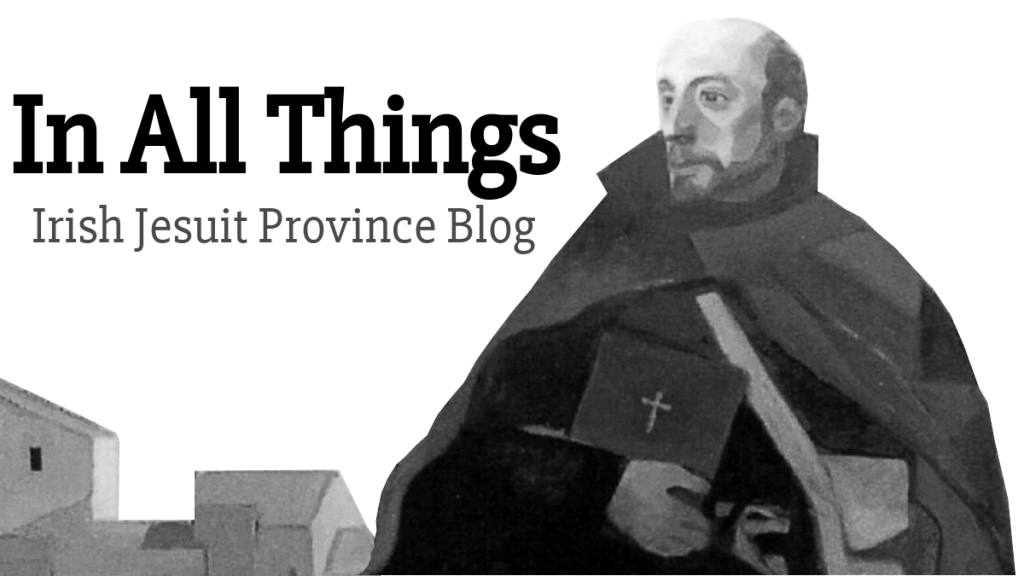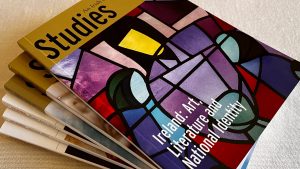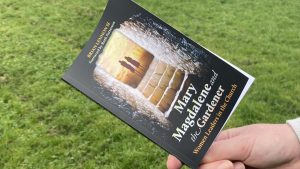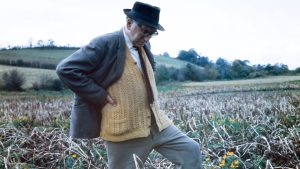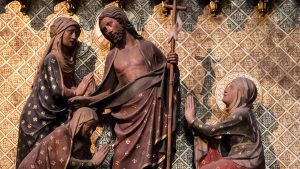Eavan Boland on women poets in Ireland
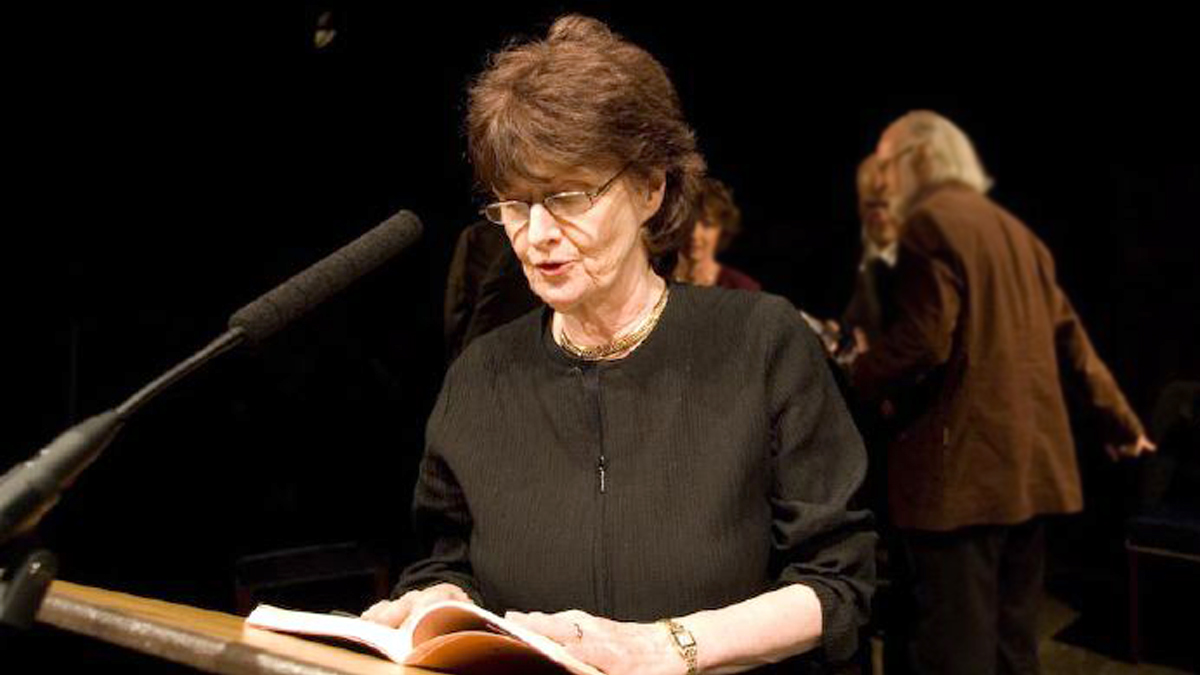
JOHN BIRD [STUDIES] :: Eavan Boland (1944-2020) was one of the most important Irish poets of the late twentieth and twenty-first century. Her influence on a whole generation of women writers was immense, both through her own poetical craft and through her efforts to support and promote her peers. Boland died in April 2020. On that occasion President Michael D Higgins remarked that the contemporary richness of Irish poetry owes much to her “encouragement and generosity to fellow poets”. She was particularly dedicated to helping Irish women to write themselves into the canon of Irish literature – “finding a voice where they found a vision”, as she put it in her poem ‘The Singers’. In the Summer 1987 issue of Studies, Boland reflected on the idea of the nation, her formative years, and a deep meditation on what she describes as poetic ethics and the position of women in Irish poetry.
Eavan Boland, ‘The Woman Poet in a National Tradition’, in Studies: An Irish Quarterly Review, Vol. 76, No. 302 (Summer, 1987), 148-158. JSTOR link: https://www.jstor.org/stable/30090853.
THE WOMAN POET IN A NATIONAL TRADITION
Eavan Boland
I have written this to probe the virulence and necessity of the idea of a nation. Not on its own and not in a vacuum; but as it intersects with a specific poetic inheritance and as that inheritance, in turn, cut across me as woman and poet. Some of these intersections are personal. Some of them may be painful to recall. Nearly all of them are elusive and difficult to describe with any degree of precision. Nevertheless, I believe these intersections, if I can observe them at all properly here, suggest something about poetry, about nationalism, about the difficulties for a woman poet within a constraining national tradition.
All of this, of course, is local and personal. It is rooted in one country and one poetic inheritance, both of them mine. For all that, I suspect if the names were changed, if situations and places were transposed, the issues involved here would be revealed as less parochial and more permanent.
Few of the feelings I am about to describe, and almost none of my deductions from these feelings, have their origin in the most universal aspect of poetry: its aesthetics. This is not an essay on the craft of the art. I am concerned here with a resource which is often overlooked but which is scarcely less formative: the ethics of poetry. These are difficult enough to pin down. They are certainly less visible than any technical curriculum. Nevertheless poetic ethics are often the concealed agenda of a poetic tradition. This may not always be apparent. In countries where the tensions between. a poet and his birthplace are inherited and established such ethics may remain an abstraction. But in other places, in Eastern Europe, in the emergent African States, in parts of black America, where such relations remain in transition, poets come early and intensely to an awareness of ethics. They would at least recognize the issues raised by arguments in this essay. For Ireland, for women, they would substitute other names. But the underlying truth is interchangeable.
Early on as a poet, certainly in my twenties, I realized that the Irish nation, as an existing construct in Irish poetry, was not available to me. It was not a comfortable realization. There was nothing clear cut about my feelings. From the first they were composed of tribal ambivalences and doubts. Nevertheless, even then, I had a fairly clear perception of the conflict which awaited me: as a poet I could not easily do without the idea of a nation. Poetry in every country draws on that reserve. On the other hand, as a woman I could not accept the nation formulated for me by Irish poetry and its traditions. Therefore it looked as if I must remain outside that poetry and that tradition, cut off from its energy, at a distance from its archive, unless, in some sense, and by some means I could re-possess it. This essay is about that conflict and that re-possession.
II
A nation. It is, in some ways, the most fragile and improbable of concepts. Yet the idea of an Ireland resolved, healed of its wounds, is an irreducible presence in the Irish past and its literature. In one sense, of course, both the concept and its realization resist definition. It is certainly nothing conceived in what Edmund Burke calls ‘the spirit of rational liberty’. When a people have been so dispossessed by history as the Irish in the 18th and 19th centuries an extra burden falls on the very idea of a nation. What should be a political aspiration becomes a collective fantasy. The dream itself is freighted with anger and invention. The Irish nation, materializing in the songs and ballads of these centuries, is a sequence of improvised images. These songs, these images, wonderful, terrible and memorable as they are, propose for the nation an impossible task: to be at once an archive of defeat and a diagram of compensation.
Yet as a child I loved these songs. Even now, in some moods and at certain times, I can find it difficult to resist their makeshift angers. And no wonder. The best of them are written within sight of the gibbet. They breathe just free of the noose. It took me years to shake off their presence. In the end, though, I did escape. My escape was assisted by the realization that these songs were effect not cause. They were the curators, not the inventors of the dream. In retrospect, I accused both them and the dream of simplification. I made then, as I make today, a moral division between what those songs accomplished and what Irish poetry should seek to achieve. The songs with their postures and angers glamourized resistance, action. But the Irish experience, certainly for the purposes of poetry, was only incidentally about action and resistance. At a far deeper level it was about defeat. The coffin ships, the soup queues, the confiscations, the betrayals. The songs, persuasive, melodic, could wish these away. Poetry could not.
III
Like many children born after the foundation of the Free State and before the establishment of the Republic, the national question was a pervasive, elusive part of my childhood. But with a difference. In my case distance exacerbated everything. My father was a diplomat. The starched collars and the dislocations of an official childhood distorted my image of Ireland. There was no Irish landscape outside my window. We went to London at the end of the 40s. My image makers as a child were just refractions of my exile: conversations overheard, memories and visitors. I listened and absorbed. Long before Ireland was my country, therefore, it had become my nation. That nation, then and later, was a session of images: of defeats and sacrifices, of individual defiances happening just out of sight. The songs enhanced the images: God save Ireland. Down by the Glenside. The Croppy Boy. No-one proposed those songs to me. I doubt if anyone in my immediate environment listened to or approved of them. I did not care. To me they were soundings of the place I had lost: drowned treasure.
And there were human images. Men and women, acquaintances of my parents, who seemed almost incarnations of the songs. When they walked out of a room, the conversation followed them. They were gossiped about with a mixture of ambivalence and wonder: they had or they had not been out on Bloody Sunday. They did or they did not shoot the British agent point-blank as he shaved in front of his mirror in Northumberland Road. It would take me years to rid myself of the virulence of these impressions; to transit the difficult, necessary distance between violent perceptions and perceptions of violence.
IV
I entered Trinity to study Latin and English. Dublin was a different world then, a city for which I can still feel Henry James’s ‘tiger pounce of homesickness’. The old ways held good. In Bewley’s they poached eggs in a rolling boil and spooned them onto thick, crustless toast. There were no discos. The lights went on at twilight. The Autumn brought a constant, violet drizzle. After the day’s lectures I took a bus from outside College. It was a short journey. Home was an attic flat on the near edge of a town that was just beginning to sprawl. There in the kitchen, on an oilskin tablecloth, I wrote my first real poems. Derivative, formalist, gesturing poems. They were derivative because I asked too few questions of the world around me and myself as a poet. I was Irish; I was a woman. Yet night after night, bent over the table, I wrote in forms explored and sealed by English men hundreds of years before. I saw no contradiction. Inasmuch as I thought about it at all, I believed that ethics and aesthetics could only be guaranteed by the technical encounter. Perhaps this was not surprising. It was the mid-60s, the heyday of the Movement in Britain. The neat stanza, the well-broken line were the very stuff of poetic identity. I never queried it. I doubt if I knew how to. In my absorption, in my lack of any sense of implication, I might have been a scientist in the 30s, bombarding uranium with neutrons.
I changed. For the sake of argument and space I must make those two words do the work and take up the slack of several years. The reasons for change are too many and look too simple. Time, marriage, children. None of these exactly account for it. All of them are implicated in it. Inexorably, I wrote my way into my own reality. Inevitably, lrishness, womanhood, things which had remained safely at the edges of the poem, moved dangerously to its centre. ‘Perhaps a simple way of putting it’ says Adrienne Rich of her own work ‘would be to say that instead of poems about experience I am getting poems that are experiences’.
By that time other things had changed as well. The oilskin tablecloth was gone. The sprawling town had become a rapacious city. The attic flat was a house in the suburbs. I was older and more realistic. I had to accept that I was a woman and a poet in a culture which had the greatest difficulty associating the two ideas. ‘No poet’ says Eliot ‘no artist of any kind has his complete meaning alone’. I existed, whether I liked it or not, in a mesh, a web, a labyrinth of associations. Of poems past and present. Contemporary poems. Irish poems.
V
Irish poetry was predominantly male. Here or there you found a small eloquence, like ‘After Aughrim’ by Emily Lawless. Now and again, in discussion, you heard a woman’s name. But the lived vocation, the craft witnessed by a human life, that was missing. And I missed it. Not in the beginning, perhaps. But later, when perceptions of womanhood and Irishness began to redirect my own work, then I greatly missed the voice of a woman in Irish poetry. Apart from any poems she might have written, what I regretted most of all was the absence of an expressed poetic life which would have dignified and revealed mine.
I cut my cloth. Whatever dignity and revelation a woman poet might have offered me I was willing to find, to any extent I could, in the work of Irish male poets. But here I ran into difficulties. I thought of myself as an Irish poet. I wanted to locate myself within the Irish poetic tradition. The dangers and stresses in my own themes gave me an added incentive to discover a context for them. I would have relished the sense of community which came early and easily to male contemporaries. I did not find it. The reasons are not easy to describe. If I say my rapport with Irish poetry faltered because of the simplifications of women in Irish poems that makes it sound more symmetrical and more conscious than it was. At first I felt only a sense of unease. Later, as my own womanhood moved toward the centre of my work, this hardened into a critique. And this is the basis of that critique: the women in Irish male poems tended to be emblematic and passive, granted a purely ornamental status. Not in every case. There were exceptions, distinctions. When male poets wrote about women in a private dimension the images were often warm and convincing. Once the feminine image in their poems became fused with a national concept then both were simplified and reduced.
This happened all too often. Most Irish poets depended on women as motifs in their poetry. Most used women to explore their own ideas about Irishness. The fusion of the national and the feminine, the interpretation of one by the other, was common practice in Irish poetry. Cathleen Ni Houlihan and Dark Rosaleen come quickly to mind. It was also hallowed custom. Both practice and custom reached back, past the songs and simplifications of the 19th century, into the Bardic tradition itself. Daniel Corkery in The Hidden Ireland has written about this, in his own analysis of the Aisling convention. ‘The vision the poet sees’ he writes there ‘is always the spirit of Ireland as a majestic and radiant maiden’.
The more I looked at these images in Irish poetry, the more uneasy I became. I did not recognize these women. These images could never be a starting point for mine. There was no connection between them and my own poems. How could there be? I was a woman. I stood in an immediate and unambiguous relation to human existences which were only metaphors for male poets. As far as I was concerned, it was the absence of women in the poetic tradition which allowed women in the poems to be simplified. The voice of a woman poet would, I was sure, have precluded such distortion. It did not exist.
In the meantime, I could only formulate my rejection of these images as they stood. I did not accept such strategies as my truth. I would not consider them as my poetic inheritance.
VI
I had better be specific. I will give two examples to illustrate my points. I have deliberately chosen ambitious and skilful poems. To do otherwise would load the argument and prove nothing. The first poem is by Patrick Kavanagh. It is called ‘Pygmalion’ and it is quoted in its entirety:
PYGMALION
I saw her in a field, a stone-proud woman
Hugging the monster passion’s granite child,
Engirdled by the ditches of Roscommon,
Stone ditches round her waist like serpents coiled.
Her lips were frozen in the signature
of Lust, her hair was set eternally,
No Grecian goddess for her face was poor,
A twisted face, like Hardship’s to me.
And who she was I queried every man
From Balladreen to grassy Boyle
And all replied: a stone Pygmalion
Once lipped to grey terrific smile.
I said: at dawn tomorrow she will be
Clay-sensuous but they only smiled at me.
There is a subject and an object in this poem and they are not what they appear to be. The subject should be the woman in the poem, her suffering and its complexity. Instead it is the poet’s intelligence, his confidence that the power of imagination could have the force of the sexual encounter. Of itself, this can only enrich the poem. Kavanagh’s voice plays over its surface, canvassing his relationship with the land in terms of the eroticism and mysticism he characteristically brought to that relationship. The problem is that the woman, who should have been the subject of the poem, is reduced to being its object; a mere projection. This is not because Kavanagh’s voice and obsession are dominant in the poem. Rather, it is because the image he argues with is not, to echo Eliot, a suitable correlative for the obsession. And there are reasons for this.
Kavanagh, after all, showed over and over again in his work – ‘Tarry Flynn’ is just one instance of it – that he could realize women with warmth and rapport. The woman in this poem is one dimensional because, under the texture and surprise of the language, she is fused with the idea of Ireland. She is not Cathleen ni Houlihan or Dark Rosaleen. Yet she refracts the tradition they incarnate. She is the degraded pastoral, an inversion of the myth of Romantic Ireland. Therefore, in the service of that argument, she ceases to be a vital poetic image and becomes a passive cipher.
The second poem is by Francis Ledwidge and it is called ‘The Blackbirds’. Once again I quote all of it:
I heard the Poor Old Woman say
“At break of day the fowler came
And took my blackbirds from their song
Who loved me well through shame and blame.
“No more from lovely distances
Their songs shall bless me mile from mile
Nor to white Ashbourne call me down
To wear my crown another while.
“With bended flowers the angels mark
For the skylark the place they lie.
From there its little family
Shall dip their wings first in the sky.
“And when the first surprise of flight
Sweet songs excite, from the far dawn
Shall there come blackbirds loud with love,
Sweet echoes of the singers gone.
“But in the lonely hush of eve
Weeping I grieve the silent bills”
I heard the Poor Old Woman say
In Derry of the little hills.
Once again, there is a subjective and objective transaction here. The blackbirds are the vital part of the poem. They call from ‘lovely distances’. Their ‘sweet songs’ ‘excite’ and ‘bless’. Like all effective poetic images they have a life outside the poem. Their energy persists when the work is finished. And once again the woman is a cipher, a dehumanized ornament of the argument. She is part of the structure of the piece but shut out from its imaginative power. She can only simplify and be simplified.
These two poems indicate, although necessarily my discussion of them is in shorthand, what happens to the image of womanhood in Irish poetry once that image and reality is edited by the idea of nationhood. The concept of the nation, the existence and force of its inherited customs, its store of emblems and refrains lies in wait for any poet, ready to ambush and overcome complexity with simplification. In Ireland where the nation was given the outline and evocative appeal of womanhood, the poet’s task became more difficult still.
VII
This essay is not about the simplification of women in Irish poetry. Certainly that is part of it. Those simplifications isolated and estranged me as a young woman and poet. But the real issue goes deeper than that. All good poetry depends on an ethical relationship between the imagination and the image. It is essential to the integrity of the poem. That relationship for me, as woman and poet, was violated by the simplification of women in Irish poetry. But it was the violation more than the simplification which alienated me.
The poetic imagination can never afford to regard the image as a temporary aesthetic manoeuvre. It must always see it as integral to the truth of the poem. Once the image is distorted the truth is demeaned. That was the heart of the matter as far as I was concerned: in availing themselves of an old convention, in using women as ornamental icons and figments of national expression, Irish poets were not just dealing with emblems. They were also evading the real women of an actual past. Women whose silence their poetry should have broken. There was an inseparable connection between the ornaments they used and the human truths those ornaments belied. The real women with their hungers, their angers, endured a long struggle and a terrible subsistence. Those women are in all our pasts. We are the heirs of their survival. They exist in history and in family archives as spectres and victims, memories and ghosts. Their suffering is our common possession. How then did they re-emerge in Irish poetry as queens, as Muses, as convenient fictions of a hollow victory? How could that happen? Only if Irish poets complied with the wishful thinking of Irish nationalism. Only if such women could be seen as ornaments, as aesthetic conventions rather than human lives.
Yet it was impossible, I believed, to have as a poet an exclusively aesthetic relationship to those women and that past. There must also be an ethical one. Neither could exist in isolation. Irish poets had no licence to make those women elements of style rather than expressions of a truth. Yet, in several cases, this is exactly what had been done. They had allowed the reflexes of their national tradition to turn a terrible witness into empty decoration.
VIII
If I seem to be accusing Irish poetry of deficient ethics, at least in one respect, I make no apology for it. Those simplified women, those conventional reflexes and reflexive feminizations of the national experience; those static, passive, ornamental figures do no credit to a poetic tradition which has been, in other ways, radical and innovative, capable of both latitude and compassion. But how do such simplifications occur? They happen, I believe, because national traditions – the Irish one is just a single example of it – have the power to edit out human complexities which do not suit its own programme.
‘I am invisible’ begins the eloquent prologue to Ralph Ellison’s novel The Invisible Man. ‘I am invisible, understand, because people refuse to see me. Like the bodiless heads you see sometimes in circus side shows it is as though I have been surrounded by mirrors of hard, distorting glass. When they approach me they see only their surroundings, themselves or figments of their own imagination – indeed everything and anything except me’.
A society, a nation, a literary tradition is always in danger of making up its communicable heritage from its visible elements. Women, as it happens, are not especially visible in Ireland. They are very indistinct indeed in its literary canon. Years ago I came to realize when I published a poem that what was seen of me, what drew approval, if it was forthcoming at all, was the poet. The woman, by and large, was invisible. It was an unsettling discovery. Yet I came to believe that my invisibility as a woman was a disguised grace. It had the power to draw me, I sensed, towards a greater invisibility; towards the suffering which lay below the surface of Irish history and out of reach of its tribalism.
Marginality within a tradition, however painful, confers certain advantages. It allows the writer clear eyes and a quick critical sense. That critical perspective, in turn, may allow him to re-locate himself within the tradition which alienated him in the first place. I wanted to re-locate myself within the Irish poetic tradition. I felt the need to do so. A woman poet is rarely regarded as an automatic part of a national poetic tradition. There has been a growing tendency, in the past few years, for academics and critics to discuss women’s poetry as a sub-culture within a larger tradition, thereby depriving both of a possible enrichment. I felt it vital that women poets such as myself should establish a discourse with the idea of a nation, should bring to it a sense of the emblematic relationship between the feminine experience and a national past.
The truths of womanhood and the defeats of a nation. An improbable intersection? At first sight perhaps. Yet the more I thought of it, the more it seemed to me if I could find the poetic truth of the first then, by virtue of that alone, I would re-possess the second. If so, then Irishness and womanhood, those tormenting fragments of my youth, would at last become metaphors for one another.
IX
I have been describing ideas and impressions as if they were events. They were not. I have been proposing thoughts, perceptions, in this essay in a way they did not and could not occur. I have given them, for the sake of argument, hard shapes and definite outlines. Such things, such definitions do not happen in the real life of a poet; and certainly not in mine.
I emphasize this to prevent the final stages of this argument from acquiring an unreal symmetry. This essay has been about the conflict, for a woman poet, with the idea of a nation, an inherited and often simplifying idea. But it has also been about the re-possession of that concept and, still more, about the need to repossess it. This is not to say that I moved with ease from one stance to the other. I did not. I reached tentative havens after figurative storms. I understood perfectly well what Mallarme had in mind when he wrote: ‘Each newly acquired truth was born only at the expense of an impression that flamed up and then burned itself out, so that its particular darkness could be isolated’.
My particular darkness as an Irish poet has been the subject of this piece. It proceeded from a number of things. I was a woman in a tradition which simplified them. I was a poet lacking the precedent and example of previous Irish woman poets. Both these circumstances displaced my sense of relation to the Irish past and its present in Irish poetry. All of these things forced me into a series of re-evaluations. These in turn and by almost infinite indirections brought me to new beliefs and fresh starts.
There are writers for whom the concept of a nation is meaningless. They argue out their identity and context in terms of social and historical symmetries which are altogether different. They are able to dismiss the suggestions of a national tradition as irrelevant to them. I was not so free. For all my quarrels with the concept of a nation, and no doubt partly because of them, I needed to find and re-possess that idea at some level of repose, compromizing neither my poetry nor my womanhood in the process. But why? Why do poets, in this country and others, return to nourish themselves within that idea? In my case, the answer grew clearer to me as time went on. I needed to re-possess my nation because, in some subterranean way, I felt myself to be part of its ordeal; because its fragmentations extended into mine. Therefore, for me, as for others, it became an act of self-possession.
That is not to say I lost sight of the difficulties. It will always be an uneasy truce. Writers do not make their home in any comfort within a national tradition. However vigilant the writer, however enlightened the nation, the dangers persist. As a woman and a poet I took issue with the idea of the nation. For that reason, more of my time than I would have liked as a young writer was spent in confusion and division; in an ethical dusk. Even when that cleared, my sense of the precariousness of the situation remained.
There is a recurring temptation for any nation and for any writer who operates within its sphere of influence to make an ornament of the past; to turn its losses to victories; to restate its humiliations as triumphs. In every age language holds out narcosis and amnesia for this purpose. But such triumphs, in the end, are unsustaining.
It all comes back to ethics. If a poet does not tell the truth about time, his or her work will not survive it. Past or present, there is a human dimension to time, human voices within it and human griefs ordained by it. Our present will become the past of other men and women. We depend on them to remember it with the complexity with which it was suffered; as others, once, depended on us.
Photo by Ian Oliver, licensed under CC BY 2.0


